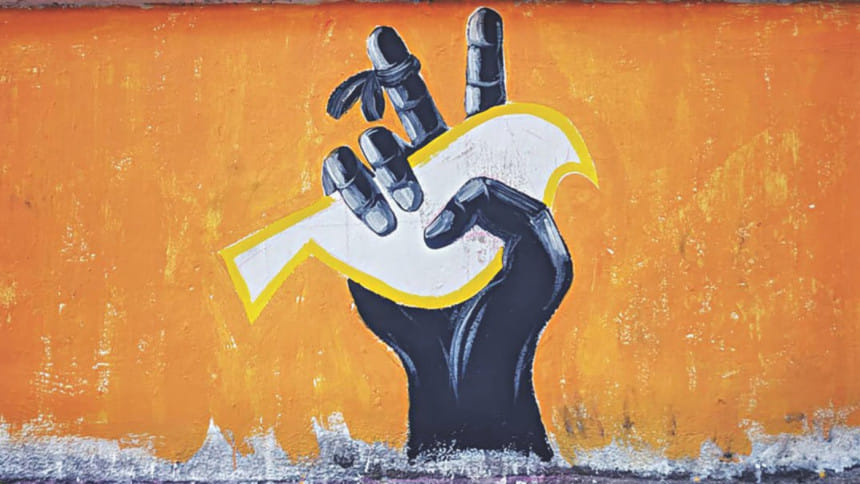A campus without student politics

Recently I went to a fourth-year class at Khulna University to hear about students' request to reschedule their class viva. When they were making their points, I was looking at their faces and was telling myself how lucky I am that I did not have to see any of my students severely beaten body. At that very moment, I found myself to be blessed and privileged that my students and their predecessors have said no to partisan politics on campus since 1991. Yet, I remembered that keeping away from the mainstream student politics has never been easy for this campus and that came at a cost.
My memories took me back to my old days when I was also a student and collectively acted to keep Khulna University free of the so-called political activities. Since there were no political demos or rallies or even cultural events, we seldom made national news. When the students demanded anything from the administration, we had to try hard to claim a space for our news coverage. If lucky enough, we celebrated a small coverage on the last page of the not so popular newspapers. Since we did not make much noise or news, we remained unrecognised by many at the national level. We were often mistaken as students of the then Khulna BIT. My friends in other universities often told me that we are almost like schoolboys, who are still mentored and nourished by teachers. They mocked us as we failed on many occasions to show solidarity with political movements on the national level. We missed chances to become heroes of the nation. People remarked that we would get more central allocation and funding if we practised politics. In fact, our campus life lacked adventures as there were no crossfires, fights or bloodshed.
However, our seniors convinced us, and we were adament that we did not want to be used for any evil practices. Although we knew about pre and post '71 student movements, we also were careful about the misuse of student politics by different parties at different times, especially since 1975. Our commitment was to have a university life that would not leave our parents worried all the time. We wanted not to kill or be killed, and we were devoted not to close our campus for political reasons fuelled by student leaders. We managed to do that, and the legacy continues. This was not achieved without paying a price. Students are often scared to raise issues to the authority lacking any political power. They often compromise their rights on the streets of Khulna when encountered by local youth leaders. Many I am sure felt, and still feel, powerless and helpless at times. Another high price of setting politics aside is the lack of ability to make a name for oneself as a leader or future leader. Graduates of this university are often not among the trusted when it comes to giving a post or position for an important role. Some even argue that because of the lack of political identity, they feel they get left-aside as they cannot show that their political philosophies flourished during their campus life. In spite of all the failures, Khulna University never lost a life in political violence, it was never closed down because of fights between rival groups and it never saw any teachers harassed by its students.
If someone is surprised about saying "no" to politics and would like to know who is behind this, I would tell them that the credit or discredit goes to the students and also the citizens and leaders of Khulna. Students made a lot of sacrifices in terms of power, money, influence, but never bowed their heads and are still trying to survive. The people of this city never wanted their children to fight while they are supposed to be receiving an education and therefore, local leaders and citizens came forward to resolve the issues that could have led to the entry of partisan politics in the Khulna University campus.
Khulna has been a unique case in the map of Bangladesh's public universities. I am not sure if this is bad or good. My pride of it is surely due to my affiliation as a student and a teacher. But those who want to follow Khulna University as a model and want to say "no" to politics must be ready to accept the reality of students' powerlessness and inability to get instant reactions. They would also have to stop waiting for student-led movements and activities. Saying no, however, will give us a peaceful campus with no political posters, no threats on young lives and no session delays because of violence. Following the Khulna case, the word "no to student politics" can only be established if citizens, students and political leaders share the same view and are on a mission to establish a pro-education student community.
Before I finish, I must come back to where I started. The students of the fourth-year course finally withdrew their request and agreed to attend the viva. They wanted this as they realised that the earlier they complete their viva, the sooner they can complete their graduation. Since their key aim for coming to university was to get educated and to contribute to society and their families, none of them wanted to fall behind and waste time on things that would add little to their future and would instead harm them.
Tanjil Sowgat, PhD, is a Professor of Urban and Rural Planning Discipline at Khulna University.

 For all latest news, follow The Daily Star's Google News channel.
For all latest news, follow The Daily Star's Google News channel. 



Comments